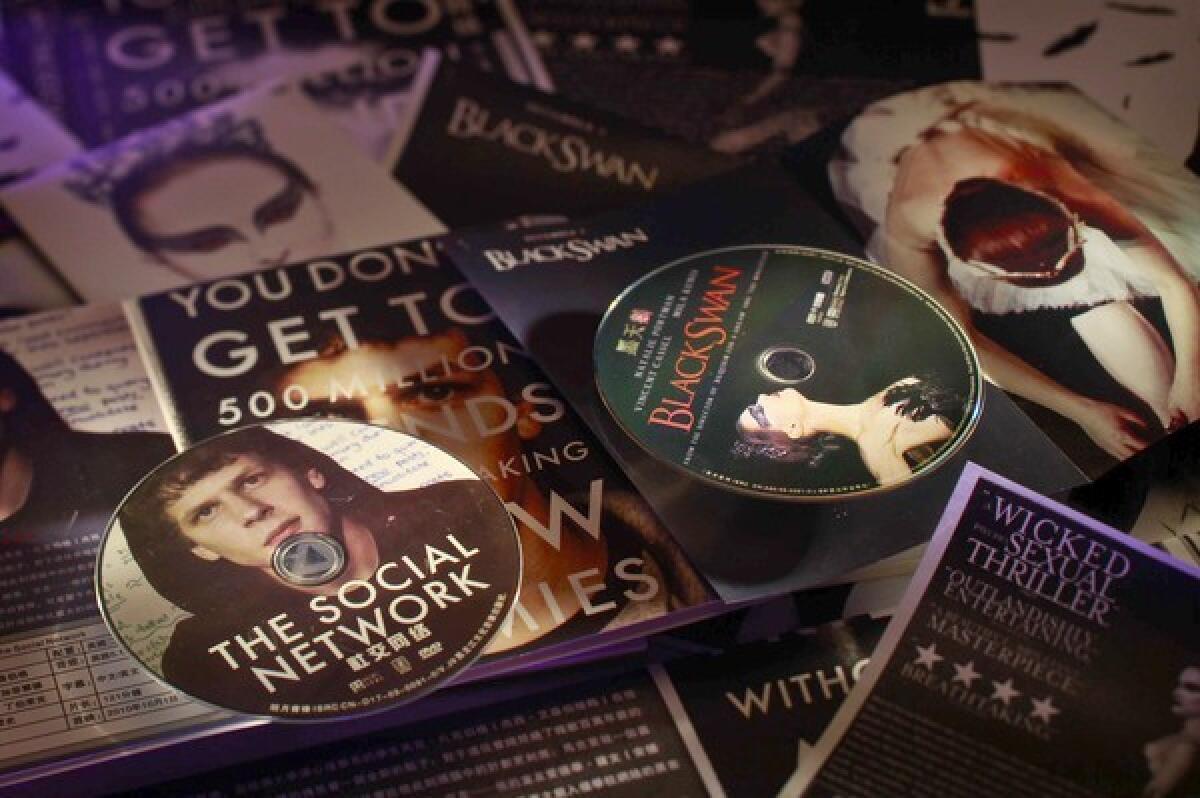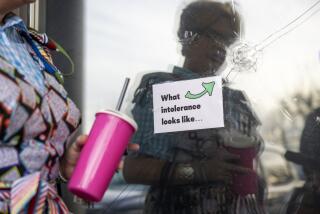DVD pirates running rampant in China

Poking around a pirate DVD shop down the block from the Apple Store in central Beijing one recent afternoon on her lunch break, Zhou Xin eyed the floor-to-ceiling selection of Oscar-nominated films, indie flicks and B-movies such as “Nude Nuns With Big Guns” before grabbing a sleek copy of “Black Swan,” complete with a blurb in English and Mandarin, for closer inspection.
“It looks creepy,” said the 26-year-old, who works in public relations. She replaced it on the shelf and picked up “The Social Network,” which she purchased for eight yuan, or about $1.22.
Asked if she had ever bought a legal foreign DVD, she replied: “Never. And even if I wanted to, there’s nowhere to go. Legal DVDs are like democracy -- they don’t exist in China.”
Thanks to globalization, rising incomes and the spread of the Internet, Chinese consumers such as Zhou have an interest in Hollywood movies like never before -- “Avatar,” for instance, grossed more money in China than any other country besides the United States. But their options for legal viewing of foreign films remain scant.
China allows only about 20 foreign movies into theaters each year, and has strict licensing rules for the sale of home entertainment products. Censors must approve of all films for legal viewing and would certainly frown upon fare such as “Black Swan,” with its explicit sex scenes, and “The Social Network,” which is about Facebook -- a service that the Chinese government blocks.
With no outlets akin to Netflix, Blockbuster or iTunes legitimately selling or renting a broad selection of titles, Chinese movie buffs opt for illegal Internet downloads or pirated DVDs. More and more piracy has migrated to the Web in China, though reliable estimates of its magnitude are hard to find. Still, bootleg DVDs -- slickly produced and packaged, some with “extras” even better than those found on legitimate discs -- remain a huge business and give an indication of the scale of the problem: According to a report in state-run media, the country’s pirate DVD industry raked in $6 billion in 2010. By comparison, China’s box-office receipts totaled $1.5 billion last year.
Authorities say they are taking robust action to thwart copyright infringement of items such as films, music and clothing and claim a crackdown has netted 3,000 people since October. But the fundamental problem, Hollywood studios and many Chinese consumers agree, is that China’s censorship policies and restrictions on home entertainment products make it nearly impossible for consumers here to buy legal copies of American films. The Motion Picture Assn. of America has estimated that nine out of 10 DVDs sold in China are bootlegged, and piracy rates for downloaded films are almost certainly as high or higher.
“We will not make serious inroads on piracy in China until we can get into that market and offer a legitimate and legal alternative,” said Greg Frazier, chief policy officer of the MPAA. The trade group, which represents the six major Hollywood studios, is hopeful that a pending World Trade Organization dispute will force China to liberalize not only the theatrical distribution of movies but also the import and sale of home entertainment products and the licensing process retailers must go through. China is expected to respond sometime this month.
Hollywood studios have started experimenting with licensing deals with Chinese video portals after major ones such as Youku and Tudou lost lawsuits and began removing copyrighted content from their sites. Youku recently licensed the Warner Bros. film “Inception,” which users can pay five yuan, about 75 cents, to watch. Tudou is to start streaming TV programs including “Desperate Housewives” and “Lost” in a deal with Disney Media Distribution. But shadowy new sites continue to pop up, and pirated DVDs are easily bought online.
Chinese consumers are so used to bootlegs that particular pirate “brands” with names like Red Dragon, Monkey King and Pegasus have loyal followings. Some of the more established pirate brands are experimenting with watermarks of their own, in an effort to distinguish their products from those made by smaller bootleg outfits. The high-end pirates don’t deal in copies of movies recorded in theaters with shaky hand-held cameras; rather, they make bootleg copies of authentic DVDs, known as D9s, that often offer more features than an authorized DVD of the same movie sold in an American Wal-Mart. Some brands put together exquisitely packaged box sets or collectors’ editions.
These sophisticated pirate operations draw on multiple sources. They’ll take video features from North American discs and combine those with the most accurate Chinese subtitles from Taiwan and Hong Kong discs. For instance, a pirated DVD version of “The Shawshank Redemption” includes an MP3 file of the entire soundtrack.
The speed of China’s DVD pirates can be astonishing: Just four days after the latest Harry Potter film premiered in theaters worldwide in November -- including in China -- the boy wizard had flown in from bootleg factories in the southern city of Guangzhou to DVD shops across Beijing.
“It’s a really quick turnaround,” said an employee at one such shop in the city’s university district. “And if a movie isn’t available we can just call and order it for you. New inventory comes in every few days.”
ainment
(Page 2 of 2)DVD pirates running rampant in ChinaReel China: With the Chinese government essentially looking the other way, major Hollywood films can be had on the cheap in Beijing and beyond within days of their theatrical release.March 22, 2011|By Dan Levin and John Horn, Los Angeles Times
The speed of China’s DVD pirates can be astonishing: Just four days after the latest Harry Potter film premiered in theaters worldwide in November -- including in China -- the boy wizard had flown in from bootleg factories in the southern city of Guangzhou to DVD shops across Beijing.
“It’s a really quick turnaround,” said an employee at one such shop in the city’s university district. “And if a movie isn’t available we can just call and order it for you. New inventory comes in every few days.”Ads by Google
IRS Voluntary InitiativeFor nondisclosed foreign accounts. LA Tax Attorney will seek amnesty. www.kahntaxlaw.com
During Hollywood’s Oscar season, DVD screeners that studios send out to voters are often copied by pirates. “Black Swan,” which debuted in U.S. theaters on Dec. 3, was available on DVD in China by late in the month.
Aside from a brief bit of text at the start of the disc warning viewers not to copy or sell the movie, the film was crystal clear. (Eagle-eyed viewers, though, might have noticed a few typos in the start-up screen added by the bootleggers: The title was rendered as “Black Sean,” and viewers had to click on “Mian Menu” to start the disc. But such imperfections bother few shoppers here.)
On the day of the Oscars, another DVD shop was sold out of the best picture winner, “The King’s Speech.” A young woman sitting on the floor packaging discs did her best to save the sale. “Don’t worry,” she chirped. “We’ll get more in tomorrow.”
Member companies of the MPAA have taken various websites, DVD vendors and an unlicensed video-on-demand service to court in China and won cases, but the penalties aren’t severe enough to discourage other bootleggers.
“What we can do here is very limited,” said Li Chow, vice president for greater China at Sony Pictures International and Columbia Tristar Films. “There are too many factories and little enforcement. You can shut them down today and they reopen tomorrow.”
“Why are these DVD shops allowed?” she continued. “That’s what we’re asking the government. You need better enforcement to stop all this.”
Chinese authorities certainly do conduct periodic crackdowns. At the Zhongguancun market in Beijing, where DVDs are sold wholesale by weight or in quantities of 100 for about 30 cents each, stands were empty and guarded by police on a recent visit. Vendors said the enforcement was launched ahead of the National People’s Congress and the Chinese People’s Political Consultative Conference in early March.
“Those two conferences are coming soon, so the government is taking these issues extremely seriously,” said one vendor who refused to give his name. “But if you really want DVDs come back tomorrow and find me.”
Given that the government has demonstrated it can stamp out the online and street sales of material it objects to, such as religious texts or democracy literature, many outsiders believe Beijing has good reason for looking the other way on commercial piracy. The business interests of the country’s military, the People’s Liberation Army, may be a factor.
“It was pretty clear to us that the PLA was involved in the replicating business. If not involved, at least condoning,” said Frazier of the MPAA.
The Hollywood trade group believes China will only get serious about piracy when its homegrown industry demands action.
Major Chinese directors are becoming increasingly vocal about the threat of piracy to China’s film industry. This month, Zhang Yimou, who directed “Raise the Red Lantern” and designed the Beijing Olympic opening and closing ceremonies, has called film theft “rampant” and said that “boosting copyright protection is key to the healthy development of film industry,” according to the official Xinhua news agency.
Some directors have resigned themselves to the efficiency of pirates. Chen Daming, who directed the Chinese remake of “What Women Want,” went to a DVD shop three weeks after the film premiered last month to buy copies of the movie after he ran out of his own discs.
“The quality wasn’t bad,” he said. “I don’t know how they do it.”
Still, he said, 20 days before being pirated is a pretty good “window” for a Chinese film -- his previous film was pirated even before it was widely released.
Whether the concerns of domestic directors are enough to alter the political calculus of China’s leaders on piracy remains to be seen.
“China’s leaders are very concerned about keeping the country together,” said Frazier of the MPAA. Piracy “may help keep the masses happy.”
Dan Levin reporting from Beijing and John Horn reporting from Los Angeles
Times staff writer Julie Makinen contributed to this report.More to Read
Start your day right
Sign up for Essential California for news, features and recommendations from the L.A. Times and beyond in your inbox six days a week.
You may occasionally receive promotional content from the Los Angeles Times.







